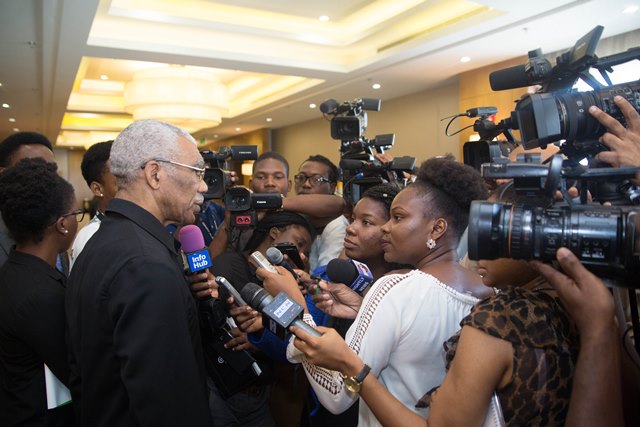President David Granger says that government’s national plan to tackle excessive alcohol consumption is being pioneered by the Ministry of Public Health and particular focus will be placed on schools.
“I think that is where the habit starts and they are trying to reduce it at the level of school children so it is expected when children don’t grow up with the habit of drinking alcohol, in excess, they wouldn’t do it when they are adults”, he said on Friday.
Granger’s remarks were made in the backdrop of recent revelations that alcohol is being served in parliament to lawmakers and that that has occurred even though the country has a serious alcohol abuse problem and there was no evidence that the government was taking effective measures.
Views have been expressed that measures to curb alcohol abuse should have priority over legislation to ban smoking in public places. Asked whether there will be legislation drafted to deal with excessive drinking, the president responded in the negative.
“No, there is nothing on the table in the cabinet about reducing the sale. Sometimes governments choose to use fiscal methods such as imposing higher tariffs on alcohol but there is no legislative measure to prevent people from drinking alcohol that would be compared with reducing tobacco smoking”, he said on the sidelines of the Council of Legal Education meeting at the Marriott Hotel.
Shortly after taking office in 2015, Granger had described alcohol as “one of two evils” that the country has to contain and assured that, over time, measures would be put in place to deal with it.
Public Security Minister Khemraj Ramjattan, last year had registered his concern about excessive alcohol consumption and expressed his willingness to work along with the ministers of Social Cohesion, Public Health and Education to assist in bringing the alcohol abuse situation in the country under control.
“It is a disease in this country,” he stressed, before also noting that enforcement of existing regulations to curb excessive drinking is needed. He said too that while he was in favour of raising the legal age for the purchase of alcohol to 21, it could be a hard sell to the populace. Currently, one must be at least 18 years old to purchase an alcoholic beverage.
Alcohol abuse has been linked to numerous road deaths, crimes, issues related to personal health and the health care system, depression, and suicide; while families, finances and the economy are also impacted.
On the question of consumption in Parliament, Granger said that he sees no issue with alcoholic beverages such as wine being present for use during birthday celebrations.
A toast
“I was the Leader of the Opposition during the 10th Parliament and I am not aware that alcohol was consumed except on the birthday of a member and somebody would bring one bottle or two bottles of wine but that was it. You have a drink, a toast `happy birthday’ and that was the end of it”, he told reporters on Friday.
This is the first time that the president has commented on the claims that Members of Parliament (MPs) consume alcohol which is served with their meals in the lounge. It was Opposition Leader Bharrat Jagdeo who said that alcohol is consumed regularly by parliamentarians. According to him, the consumption does not only take place on special occasions such as birthday celebrations but at every sitting.
Granger was adamant that having a birthday drink ought not to be an issue. “It’s a birthday and a glass of wine. It’s typical in lunch in many countries. It’s not regarded as binge drinking”.
Clerk of the National Assembly Sherlock Isaacs had revealed to a House Committee that there was a $700,000 per sitting price tag for catering. Subsequent to this, the issue of alcohol consumption was raised.
Both Isaacs and former Speaker and Alliance for Change Leader Raphael Trotman have said that alcohol is only provided for during special occasions, such as the sittings before Christmas and following the last sitting before the parliament goes into recess.
“This is my 20th year as a Member of Parliament and on special occasions, such as Christmas or when the House is going into annual vacation, a limited amount of alcoholic beverages are available in the Members’ Lounge. This is a facility available at the end of the sitting and members who wish to participate may do so,” Trotman said.
And on his own perspective, he posited, “In short, I don’t have an issue as long as it does not interfere with the business of the House and is consistent with the practice in most other parliaments.”
Government MP and Leader of the Justice for All Party, Jaipaul Sharma, also said that alcohol is not afforded to members of the House at every sitting. He recalled that it is only before recess and at Christmas that drinks would be available, although he was quick to point out that he is not a drinker of alcohol.
Sharma added that although there are times when members would also treat their colleagues to celebratory drinks when they celebrate their birthdays, on those occasions the beverages are always bought by parliamentarians themselves.
At a press conference held on August 16, Jagdeo called for the Parliament Office to remove alcoholic drinks from among the beverages available to members of the National Assembly.
Jagdo told reporters that he has seen MPs imbibing. “I have seen it. Anyone who is in that Parliament would see it. It happened frequently not just at Christmas time…and if you had a breathalyser …something over the door of Parliament and you walk through it and it beeps then you will see,” he said while adding that this situation is very serious.






